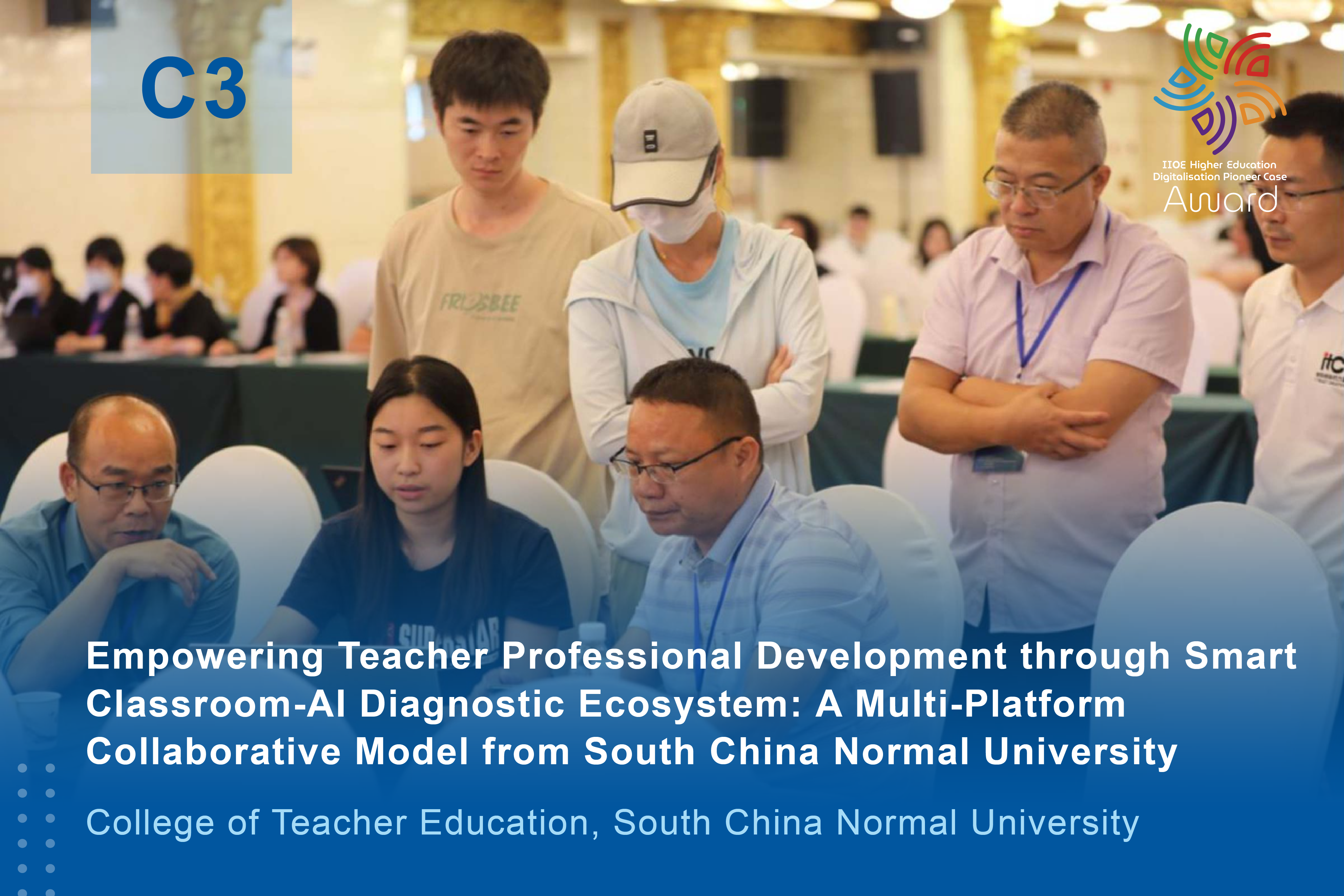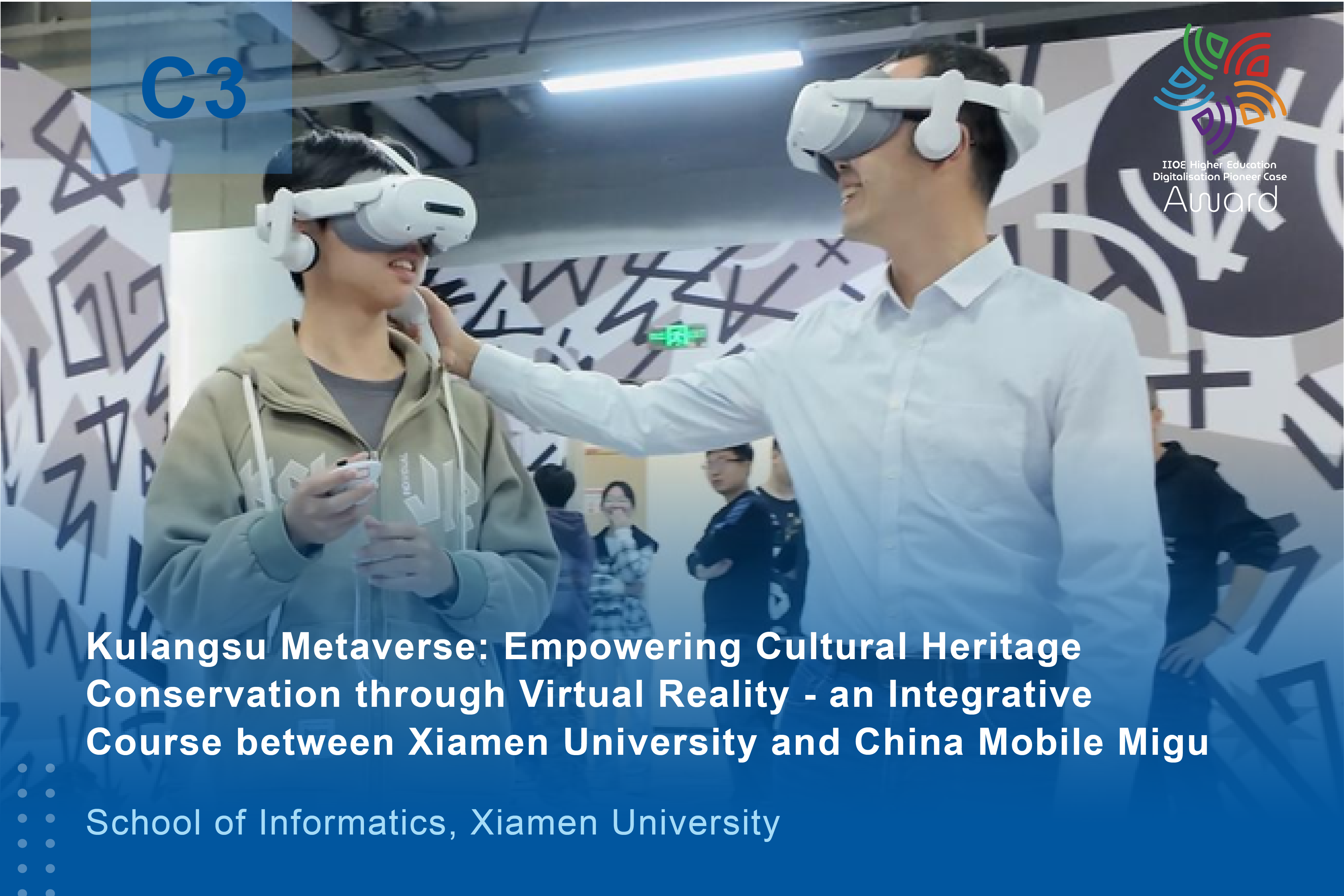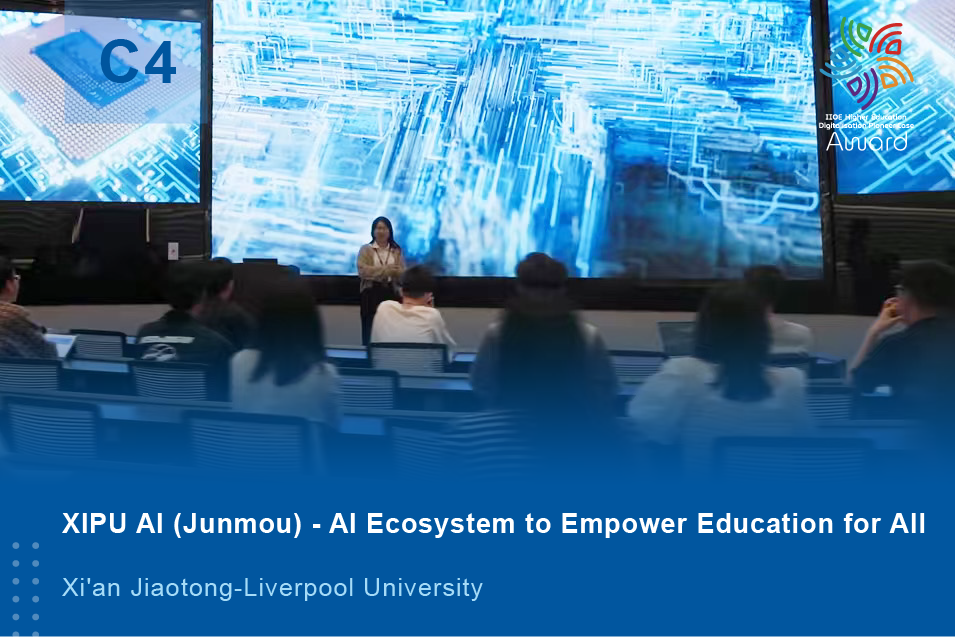Case Sharing of the 2025 IIOE Pioneer Award ④

The "BGI Group · 2025 IIOE Digital Higher Education Digitalisation Pioneer Case Award" (hereinafter referred to as the "Pioneer Award") has officially announced its winners. Since its launch, the award has garnered wide attention, receiving 66 valid submissions from 29 countries around the world. A total of 22 outstanding cases from Asia, Africa, and Latin America stood out, including 12 from overseas higher education institutions, 4 from Chinese universities, and 6 from enterprises.This year, one of the world's leading life science and genomics organizations, BGI Group and BGI College, sponsored the IIOE Pioneer Case Award. BGI Group and BGI College are dedicated to life science and genomics research, and cultivate talents for the field. The sponsorship has demonstrated its remarkable support in bringing equitable higher education.
In this edition, we introduce three outstanding cases of HEIs (Higher Education Institutions) in Category 3:Leveraging Smart Classroom Operations for Teaching and Learning Innovation and Excellence, and Category 4: Strengthening Global Industry-University Collaboration for Higher Education Digital Empowerment.
What is Smart Classroom Project & Multilateral Collaboration?
The Smart Classroom Project focuses on improving infrastructure for Higher Education Institutions (HEIs) in developing countries in Asia and Africa to support digital learning and accelerate the digital transformation of higher education. In collaboration with Southern University of Science and Technology (SUSTech) and leading enterprises in China, the International Centre for Higher Education Innovation under the auspices of UNESCO (UNESCO-ICHEI) donates Smart Classrooms supported by Cloud Computing, Big Data, IoT and AI in one partner HEI from each programme country as an exemplary project. The Smart Classrooms will support digital learning, management, analytics, curriculum development and other comprehensive learning activities to meet the basic needs for digital transformation in HEIs.
Multilateral Collaboration in higher education's digital transformation focuses on collaboration among universities, industry partners, international organizations, and other institutions in areas such as appropriate infrastructure, talent cultivation, and teacher empowerment, as well as joint efforts in co-developing curricula and designing projects.
Case 1 Empowering Teacher Professional Development through Smart Classroom-AI Diagnostic Ecosystem: A Multi-Platform Collaborative Model from South China Normal University

Project Background
In recent years, China has attached great importance to the digitalization and intelligent transformation of education. The Ministry of Education has introduced a series of policies to promote the application of emerging technologies such as artificial intelligence, big data, and cloud computing in teacher development and talent cultivation. South China Normal University, aligning with China's education digitalization strategy, has been exploring the digital and intelligent transformation of teacher education. This project aims to apply smart classrooms and the "Shi Neng Bang" system to address the challenges faced by pre-service teacher candidates, graduate students, and in-service teachers across different schools and educational stages in their professional growth.
Project Implementation
The project, led by the College of Teacher Education at SCNU, brings together an interdisciplinary team of experts and has undergone continuous iteration and refinement over six years, with the goal of advancing the digital and intelligent transformation of teacher education. The SCNU team has developed a teacher competency framework and the "the Shi Neng Bang-AI Diagnosis System for Classroom Teaching Competency", while also integrating data from multiple platforms to build comprehensive teacher competency models.
Moreover, the team has combined the "Shi Neng Bang" system with smart classrooms, applying it in various contexts such as pre-service internships, graduate courses, in-service training, and school-based research, and has promoted its adoption nationwide. Supported by the Ministry of Education's "AI Collaborative Platform for Teacher Education", the project integrates the "Shi Neng Bang" system, "South China Teachers Online," and other digital platforms to form a national digital hub for teacher education, fostering cross-regional professional development communities for teachers. Meanwhile, the project actively contributes to national and provincial key initiatives in China, promoting the broad application and sharing of its outcomes.
Project Outcomes
Since its launch in 2020, the project's "Shi Neng Bang" system has served more than 300 educational institutions and government education departments across China, benefiting over 30,000 teachers, including pre-service teacher candidates and graduate students. The "South China Teachers Online" platform has supported more than 600 teacher training programs. In terms of digital teaching capacity, the project has significantly enhanced both pre-service and in-service teachers' classroom teaching abilities and digital literacy through AI-based diagnostics and personalized training. Several pilot schools have achieved outstanding results in provincial-level teaching competitions. From the perspective of cross-institutional research collaboration, seven normal universities have established a cooperative mechanism of "data sharing—intelligent analysis—joint research—knowledge dissemination" based on the platform, which has incubated a number of cross-institutional research projects and outcomes.
Jury's Comments: The case of South China Normal University shows a comprehensive intelligent system that effectively integrates the university's teaching platform, smart classroom system, and teacher training platform to support data-driven precision teaching for both pre-service and in-service teachers. This project has not only enhanced the teaching effectiveness within the university, but also facilitated regional practice sharing through an open and collaborative university alliance, demonstrating the positive impact of effective technological support and AI on improving teaching quality.
Case 2 Kulangsu Metaverse: Empowering Cultural Heritage Conservation through Virtual Reality - an Integrative Course between Xiamen University and China Mobile Migu

Project Background
China's strategic priorities in education digital transformation, exemplified by policies such as "Smart Education of China" and "Digital China", have driven universities to deeply integrate emerging technologies into teaching and research. In response to these national strategies, as well as challenges in higher education such as fragmented knowledge systems, outdated curricula, and insufficient evaluation standards, the School of Informatics at Xiamen University has, since 2018, offered the undergraduate course "Virtual Reality Technology and Applications". This course not only teaches cutting-edge virtual reality tools and frameworks but also uses real-world cultural heritage preservation projects as its teaching "classroom," closely linking education with public interest and national industrial strategies.
Project Implementation
Building on the course, this project has established a comprehensive pathway that integrates co-designed curricula, localized practices, project-driven learning, and institutionalized dissemination. The initiative unfolds across three phases of practice: First, in response to regional needs for introducing digital technologies into cultural heritage preservation, the course team localized and embedded into the curriculum the global practices of smart classroom operation and digital literacy enhancement advocated by the International Institute of Online Education (IIOE). Working with industry partners, the team co-developed course modules tailored to the preservation needs of Kulangsu, including spatial modeling, virtual storytelling, and digital tourism solutions, guiding students to apply VR/AR tools in real-world contexts.
Second, the course adopted the HyFlex blended teaching model promoted by IIOE, offering flexible participation for both online and on-site students. Supported by smart classrooms and digital industry tools, students engaged in virtual laboratories and immersive scene demonstrations, simulating both industrial and heritage environments. Third, the teaching team authored a three-volume textbook, providing a standardized and replicable implementation model. Meanwhile, Xiamen University has regularly hosted virtual teaching seminars, training sessions, and forums, thereby expanding the project’s academic and practical influence.
Project Outcomes
Through immersive project-based learning and strong industry–academia collaboration, this initiative has significantly enhanced students’ innovation capacity, academic research skills, and career readiness, while generating notable achievements in social impact, scholarly outcomes, and industry integration. The project has been showcased in over twenty exhibitions, drawing large audiences and international attention. It has also received broad recognition, earning distinctions such as the "Cases of Enhancing Sustainable Development through the Protection and Promotion Cultural Diversity in the Digital Environment" by UNESCO and the "2023 National Cultural Metaverse Demonstration Case" award.
In terms of research–teaching integration, joint R&D with industry partners has resulted in four invention patents and a technology transfer licensing agreement. The project has also produced three application platforms and 169 real-world cases. On the dissemination front, the teaching team developed three textbook series, which have been adopted by more than twenty universities, with nearly 10,000 copies sold. Moreover, the model has been scaled through a virtual faculty training network, reaching over eighty universities, and has been formally implemented at Xiamen University Malaysia.
Jury's Comments: The project goes beyond the traditional classroom space by leveraging VR and AR technologies to provide students with a flexible learning environment that integrates multiple disciplines and cultural literacy. It also highlights the importance of multilateral collaboration, effectively combining industry's technological strengths with universities' design and academic expertise. The outcomes have become an open resource that higher education stakeholders can draw upon as a reference.
Case 3 XIPU AI (Junmou) - AI Ecosystem to Empower Education for All

Project Background
Since the release of ChatGPT 3.5 in November 2022, artificial intelligence (AI) has had a profound impact on the world and various industries. In response to the rise of AI and the evolving demands it places on talent, Xi'an Jiaotong-Liverpool University (XJTLU) has formulated the "XJTLU Education + AI Strategic Framework", which aims to enhance human capabilities while preserving the uniqueness of human wisdom. Through international collaboration and the deployment of AI-driven educational technology ecosystems, XJTLU seeks to advance the digital transformation of educational institutions, reform education systems, and strengthen both faculty and student AI literacy and competencies.
Project Implementation
XJTLU is actively exploring pathways for digital transformation in education in the era of artificial intelligence, developing an application model that combines a global outlook with localized practices. At the international collaboration level, XJTLUhas established a strategic partnership with UNESCO-ICHEI, consistently contributing high-quality open educational resources to the IIOE platform with a strong focus on AI literacy. Inclusive and equitable education, along with lifelong learning, has been embedded into XJTLU's strategic planning.
At the technological development level, XJTLU has independently developed and launched the XIPU AI platform, introducing cutting-edge technologies such as natural language processing, machine learning, and big data analytics into higher education contexts. The platform supports diverse needs in teaching, research, and administration, while ensuring data security and autonomous control. At the AI educational ecosystem level, XJTLU has not only deeply integrated infrastructure and educational technologies into higher education, but also embedded AI into the full spectrum of teaching and learning, driving systemic digital transformation and enhancing both faculty and student AI literacy and competencies.
Project Outcomes
Since its launch, the XIPU AI platform has attracted more than 26,600 users, serving as the core foundation of XJTLU's comprehensive Education+AI Development Action Plan. In empowering teaching and learning, XIPU AI offers robust functions such as intelligent Q&A, modeling, workflow simplification, and AI agents, effectively meeting the diverse needs of higher education. The platform deeply embeds AI into teaching, learning, assessment, research, and management, creating integrated "AI+" application pathways. By reimagining and redesigning workflows, AI significantly improves efficiency, reduces burdens for both staff and students, takes on repetitive tasks, and provides abundant resources and auxiliary support to address human limitations. In innovation and localization, XIPU AI continuously keeps pace with cutting-edge research developments and adapts them to local contexts, transforming ideas into practical and applicable functions. Moreover, to ensure equity and inclusiveness, the platform provides training and services to help users overcome challenges while adopting AI, and introduces scientific approaches to address societal concerns and expectations regarding its impact.
Jury's Comments: XIPU AI presents an institution-wide AI-powered digital ecosystem. It combines 20+ large language models, AI tutors, automated administration, and personalized learning. The depth and integration across pedagogy, research, and operations is impressive.
The above are three outstanding practice cases of HEIs in Category 3:Leveraging Smart Classroom Operations for Teaching and Learning Innovation and Excellence, and Category 4: Strengthening Global Industry-University Collaboration for Higher Education Digital Empowerment of this year's Pioneer Award. These cases demonstrate how different HEIs achieve high-quality education through smart classroom operations, and how collaboration among universities, between universities and international organizations, and between universities and industry partners drives digital empowerment in higher education. In the next issue, we will introduce cases from industry partners recognized in this year’s Pioneer Awards. Please stay tuned for the subsequent updates in the coming weeks!
About the Pioneer Award
The IIOE Higher Education Digitalisation Pioneer Case Award is established by UNESCO-ICHEI in Shenzhen, China. This award aims to recognize pioneering efforts that promote educational innovation, digital capacity building, and multilateral collaboration globally through the ecosystem of the International Institute of Online Education (IIOE). Aligned with the evolving trends in higher education, the award is dedicated to identifying and showcasing the latest innovative practices and development achievements among IIOE partners.
The theme of the 2025 Pioneer Award is "IIOE Ecosystem-driven Promising Practices: Empowering Workforce, Innovation, and Collaboration", which aims to recognise achievements of teams and individuals of IIOE partners, who are pioneering IIOE flagship projects to facilitate digital transformation. The award received submissions in four key areas as follows:
Developing Digital and AI Competencies through IIOE Micro-certification
Enabling Localised Digital Empowerment Initiatives through IIOE National Centres
Leveraging Smart Classroom Operations for Teaching and Learning Innovation and Excellence
Strengthening Global Industry-University Collaboration for Higher Education Digital Empowerment.
The award aims to identify leading teams and individuals driving digital transformation in IIOE flagship projects.




